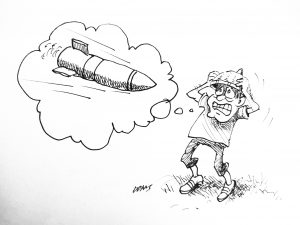Rumors of war have been the source of human fear, speculation and anxiety throughout history. With the advent of modern communication technology, rumors have become even more pervasive, widely spread and difficult to verify or refute. These rumors are particularly troublesome because they can fuel tensions, trigger conflicts and undermine confidence in peaceful solutions.
Said rumors of war can be caused by various factors, including misunderstandings, propaganda, deliberate falsehoods and genuine concerns. Tensions arising from territorial disputes, ideological differences, economic competition, religious conflicts or historic enmities can easily generate rumors of impending war. Modern media platforms, such as social media, can amplify and spread rumors at a faster pace and with greater reach, often without regard for accuracy or context. Furthermore, governments, political groups, and other actors may deliberately spread rumors to advance their agendas or manipulate public opinion. In some cases, rumors of war may be rooted in genuine fears and anxieties, as people try to make sense of complex and uncertain situations.
The consequences of rumors of war can be serious and far-reaching. At the individual level, rumors can cause fear, panic, and anxiety, leading to emotional and physical harm. At the societal level, rumors can fuel tensions, exacerbate conflicts, and undermine confidence in peaceful solutions. Rumors can also increase military spending, trigger arms races, and lead to real military deployments and actions. When rumors are spread irresponsibly, they can have long-lasting repercussions, such as stigmatizing ethnic or religious groups, perpetuating stereotypes, and promoting hate speech. As such, it is essential to address these rumors with a sense of urgency and responsibility.
Dealing with this misinformation requires a multi-faceted approach. Governments, civil society organizations, and media outlets can play a crucial role in promoting peace, intervening to prevent conflicts and addressing misinformation. One way to combat rumors is to increase transparency and communication channels, providing clear and accurate information to the public. Another method is to build trust among communities that may distrust each other, by promoting dialogue, negotiation, and cooperation. Additionally, strengthening legal frameworks, such as hate speech and defamation laws, can help to counteract malicious rumors and propaganda. Finally, education on critical thinking and media literacy can help to empower individuals to recognize and question rumors, using their judgment and cognitive abilities to seek the truth.
By raising awareness, promoting dialogue, increasing transparency, and strengthening legal and educational frameworks, we can create a more peaceful and informed society, capable of reasoning and rational thinking. Ultimately, our collective efforts in countering rumors of war can contribute to building a world where conflicts are resolved through peaceful means, mutual respect, and understanding.




